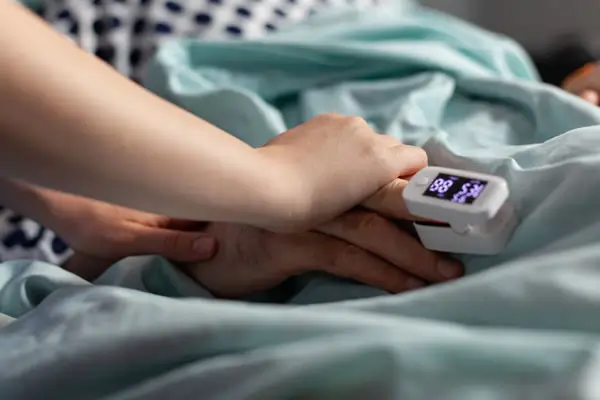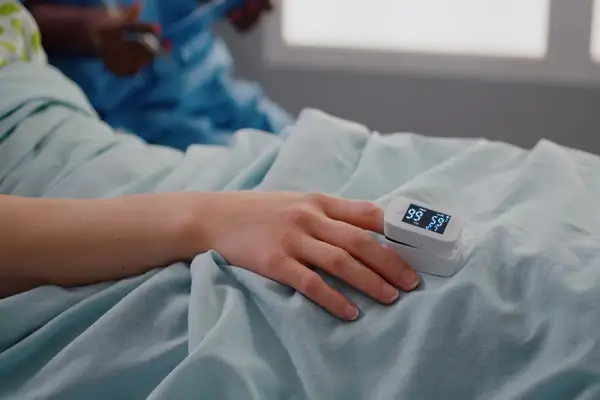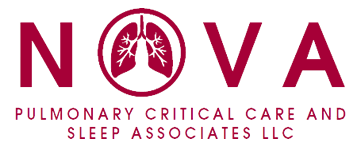What is Overnight oximetry?
Overnight oximetry is a medical test that measures the levels of oxygen in a person’s blood during the night while they sleep. It is commonly used to assess and monitor individuals with respiratory or sleep-related disorders, such as sleep apnea.
What is the process for Overnight oximetry?
Here’s how the overnight oximetry process generally works:
- Device Placement: A small, portable device called a pulse oximeter is attached to the patient. This device typically consists of a sensor that is clipped onto a finger, toe, or earlobe. Some devices may also include additional sensors for monitoring heart rate.
- Monitoring Period: The patient wears the oximeter throughout the night while they sleep. The device continuously measures the oxygen saturation levels in the blood, which is the percentage of hemoglobin molecules carrying oxygen.
- Data Recording: The oximeter records and stores data, including oxygen saturation levels and heart rate, over the course of the night. Some devices may also track patterns of oxygen desaturation (drops in oxygen levels) and the duration of these events.
- Analysis: After the monitoring period is complete, healthcare professionals analyze the recorded data. They look for patterns that may indicate sleep-related breathing disorders, such as sleep apnea. Oxygen desaturation events during sleep can help identify periods of disrupted breathing.
- Diagnostic Insights: The results of the overnight oximetry test can provide valuable information for diagnosing and managing various respiratory and sleep disorders. It may help healthcare providers determine the appropriate course of treatment or further testing.
Why Overnight oximetry?
One common application of overnight oximetry is in the evaluation of sleep apnea, a condition where a person’s breathing is repeatedly interrupted during sleep. The drops in oxygen saturation levels that occur during apnea episodes can be detected and analyzed through overnight oximetry.
It’s important to note that while overnight oximetry can provide useful information, it may not be as comprehensive as other sleep studies conducted in a sleep clinic. In some cases, healthcare professionals may recommend more extensive sleep studies, such as polysomnography, for a thorough evaluation of sleep-related issues.


Meet the team at NOVA Pulmonary Critical Care and Sleep Associates

Dr. Aditya N Dubey, M.D, F.C.C.P. – Founder
Specialty:
Pulmonary, Critical Care and Sleep Medicine
Board Certified by American Board of Internal Medicine in the Subspecialities of Pulmonary Medicine, Critical Care Medicine and Sleep Medicine. Learn more about Dr. Dubey
Aditya N Dubey, M.D., F.C.C.P. – Founder
Dr. Aditya N. Dubey is quadruple board certified in Internal Medicine, Pulmonary Medicine, Critical Care Medicine, and Sleep Medicine.
Dr. Aditya Dubey completed his residency in Internal Medicine at University of Pittsburgh Medical Center McKeesport, PA in 2004. He then sought advanced training in lung disorders as well as in taking care of critically ill patients. He completed fellowships in Critical Care Medicine at University of Pittsburgh Medical Center in Pittsburgh, PA and Pulmonary Medicine at Graduate Hospital, Philadelphia, PA.
Dr. Aditya Dubey has authored many abstracts and articles and has presented his research at conferences around the country.
He is a Fellow of the American College of Chest Physicians. He is a member of the American Thoracic Society and Society of Critical Care Medicine.
Dr. Aditya Dubey is a highly rated Northern Virginia Pulmonologist and Sleep Specialist based out of Dulles, VA and Lansdowne, VA providing both inpatient and outpatient diagnoses & treatments in Pulmonary and Sleep Medicine. He has been recognized as “Top Doctor” by the Northern Virginia magazine Top Doctors issue. He currently lives in Northern Virginia with his wife and kids. He enjoys traveling with his family and exploring new areas.
Specialty:
Pulmonary, Critical Care and Sleep Medicine
Board Certified by American Board of Internal Medicine in the Subspecialities of Pulmonary Medicine, Critical Care Medicine and Sleep Medicine

Dr. Petra Thomas, M.D.
Specialty:
Pulmonary Medicine
Board Certified by American Board of Internal Medicine in the Subspecialities of Pulmonary Medicine. Learn more about Dr. Thomas
Petra Thomas, M.D.
Dr. Petra Thomas is board certified in Internal Medicine and Pulmonary Diseases. She completed her MD degree at Temple University School of Medicine in 1990, her residency at Washington Hospital Center in 1993, and her Pulmonary fellowship at George Washington University, Washington D.C. in 1996.
She is a member of the American College of Chest Physicians and has been in practice since 1996, having done both critical care and pulmonary for the earlier portion of her career. She currently practices outpatient pulmonary medicine and is accepting new patients. Her treatment goals are to educate her patients so that they are active participants in their care.
She lives in Northern Virginia with her son and enjoys spending time with family, friends, biking and traveling.

Dr. Arman Murabia, M.D.
Specialty:
Pulmonary, Critical Care and Sleep Medicine
Board Certified by American Board of Internal Medicine in the Subspecialities of Pulmonary Medicine, Critical Care Medicine and Sleep Medicine. Learn more about Dr. Murabia
Arman Murabia, M.D.
Dr Murabia is a Pulmonary, Critical Care, and Sleep Medicine trained physician. He completed his residency at Brooklyn Methodist Hospital/Weill Cornell in New York. He then went on to complete his pulmonary fellowship at Norwalk Hospital/ Yale University where he was chief and published several articles in the journal for American Thoracic Society. He completed his critical care training at Yale New Haven Hospital/ Yale University and then went on to complete sleep fellowship at Norwalk Hospital/ Yale University.
Dr. Murabia has a keen interest in Sleep disorders including insomnia and is accepting new patients. He currently lives in Northern Virginia with his wife and two sons and enjoys hiking, fishing, and traveling.
He is fluent in Spanish, Urdu, Punjabi and Hindi.

Rebekah Lee, AGNP-C
Nurse Practitioner. Learn more about Rebekah Lee
Rebekah B. Lee, AGNP-C
Rebekah Lee is an Adult-Gerontology Nurse Practitioner (AGNP) who obtained her Master of Science in Nursing from George Mason University where she received a graduation award for excellence in primary care.
As an AGNP, Rebekah evaluates, diagnoses and treats patients across the adult lifespan from adolescence into advanced age. Prior to becoming an AGNP, Rebekah worked for 9 years as a registered nurse caring for patients in hospital step-down units, as well as outpatient surgical and medical office settings.
Rebekah is board certified through the American Association of Nurse Practitioners as an Adult-Gerontology Primary Care Nurse Practitioner and she is a member of the Sigma Theta Tau International Honor Society of Nursing.
Rebekah lives in Northern Virginia with her husband and children. She enjoys sharing conversation and food with her family and friends.

Christine Amorosi, AGNP-C
Nurse Practitioner. Learn more about Christine Amorosie
Christine F. Amorosi, AGNP
Christine Fay Amorosi is an Adult-Gerontology Nurse Practitioner (AGNP) who is currently completing her Doctoral of Nursing Practice (DNP) at Marymount University and obtained her Master of Science in Nursing from George Mason University. Christine holds a Faculty position at Marymount University where she teaches and trains Nurse Practitioner students.
As an AGNP, Christine evaluates, diagnoses and treats patients across the adult lifespan from adolescence into advanced age. Prior to joining NOVA Pulmonary, Christine worked as an Adult Primary Care NP at Virginia Hospital Center and continues to volunteer at a safety-net Adult Primary Care Clinic. Prior to becoming an AGNP, Christine worked for 15 years as a registered nurse caring for patients in hospital medical/surgical and oncology units, as well as outpatient surgical and primary and specialty practice office settings.
Christine is board certified through the American Association of Nurse Practitioners as an Adult-Gerontology Primary Care Nurse Practitioner and she is a member of the Sigma Theta Tau International Honor Society of Nursing- Eta Alpha Chapter.
Christine lives in Northern Virginia with her husband and children. She enjoys traveling, skiing, and hiking with her family and friends.
Office Locations
Conveniently located near you in Loudoun and Fairfax VA
NOVA Pulmonary – Dulles
24430 Stone Springs Boulevard
Suite 200
Dulles, VA 20166
NOVA Pulmonary – Lansdowne
19415 Deerfield Avenue
Suite 301
Landsdowne, VA 20176
NOVA Pulmonary – Vienna
124 Park Street SE
Suite 203
Vienna, VA 22180
